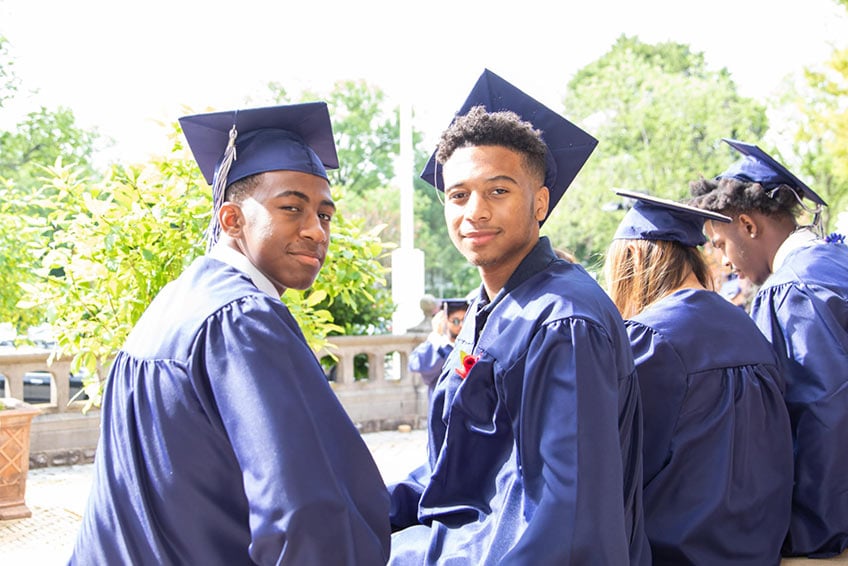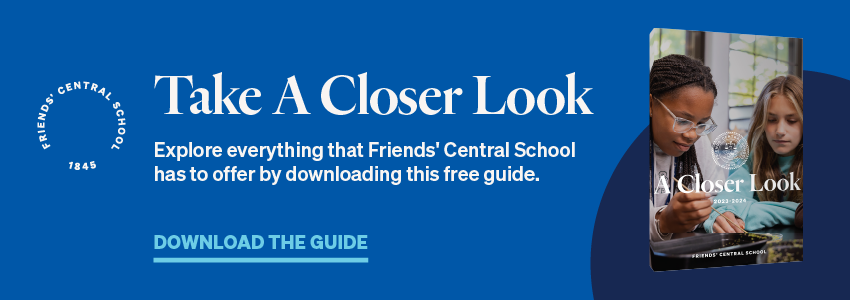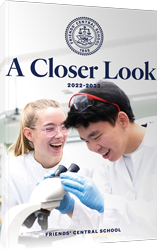 As we have seen in recent months, the coronavirus pandemic has had a tremendous impact on many parts of our lives. This is especially true in the world of education. In the earliest months of the pandemic, schools were forced to shift to a distance learning model, and even today some schools remain partially or fully remote.
As we have seen in recent months, the coronavirus pandemic has had a tremendous impact on many parts of our lives. This is especially true in the world of education. In the earliest months of the pandemic, schools were forced to shift to a distance learning model, and even today some schools remain partially or fully remote.
Free Downloadable Guide: Take a Closer Look at Friends' Central School
With the end of the calendar year approaching and the start of the spring semester right around the corner, many 11th graders and their families have begun to turn their attention toward college planning. In a normal year, this is the time many high school juniors start to think about possible college options and when many high school seniors have already made most of their application decisions.
Of course, as with so much else, the college process has been and will continue to be affected by COVID-19. Below, we take a look at four ways the pandemic has changed the process and offer suggestions for students and families unsure of the best way forward.
College Planning During COVID-19: 4 Changes
1. Optional Standardized Testing
“Test optional” means that a college or university accepts standardized test scores, but does not require them as a part of the application process.
In 2019, hundreds of institutions were already test optional. The challenges of administering standardized tests during the COVID-19 pandemic led hundreds more to announce that they would also be test optional, at least through the 2020-2021 admissions cycle. Some of the newly test optional schools have said that they will remain so for two or three years after which they will look at the data and decide whether to make this policy change permanent.
We suggest that our 12th graders applying to colleges this fall, who have test scores, only send them to those (test optional) colleges on their lists for which their scores are at or above the average for admitted students. Not submitting test scores that are below the average for admitted students at a particular (test optional) college makes it easier for the college to admit that student, assuming the rest of the student’s academic record fits the institution’s admit profile.
We suggest that our 11th graders consider taking either the ACT or SAT, even if the schools they will be applying to will be test optional in the 2021-2022 admissions cycle. Then, once they have a sense of their standardized testing score range, they can be strategic about the colleges to which they send their scores.
The “test optional” policy does provide some students who have strong academic records, but whose testing may not be at or above the average for admitted students at particular colleges or universities, the opportunity to be more competitive applicants at those institutions.
2. Virtual College Visits
College visits can be extremely informative, and help students narrow down the list of colleges to which they ultimately apply. For that reason, we typically recommend that students begin visiting colleges in 11th grade. The fall of 12th grade is also a good time to visit a few more schools or to revisit one or two, especially, in the latter case, if a (binding) early decision application is being considered.
The pandemic has greatly reduced in-person college visiting options for current 12th graders, many of whom were hoping to head off on spring break visiting trips just as the first lock-down period began last March. Self-guided tours are still an option on most campuses, but access to facilities is strictly limited. Small in-person tours are being offered at a number of colleges. Check with the admissions offices and expect to wear a mask at all times.
Happily, virtual visits and tours are a very good alternative and come with some real benefits. When students must visit a college virtually, which is to say online, they tend to look at the whole college website more carefully. They are less likely to be swayed by the weather on the day of an in-person visit or by the personality of the tour guide. They make better "apples to apples" comparisons and are often open to considering a broader array of schools.
3. Uncertainty Surrounding Deferrals
Many current seniors (Class of 2021) have been worried that deferrals from last year's Class of 2020 will mean fewer spaces available to them in the current admissions cycle. So far, this does not appear to be the case, and some colleges have contacted students and counselors to reassure them that they will be considering first-year applicants for the same number of spots as in the previous cycle.
4. Long Term Uncertainty
College applicants should always be careful consumers as they consider their higher education options, but it is arguably even more the case this year than in the past. Some colleges may not survive the pandemic and plenty of others will find it necessary, or advantageous, to restructure or cut various programs and majors.
Institutions with larger endowments will tend to be more insulated from the impact of the enormous additional expenditures the pandemic has engendered.
It will also be worth taking a close look at how particular colleges have organized the current school year and to evaluate how committed they seem to be to a return to full residential programs and in-person classes in the fall of 2021.
Don’t Put Off College Planning
With respect to the college admissions process, the pandemic may limit opportunities in some cases, but it will also create new ones. Applicants should do their research. They should feel free to email college administrators, admissions officers, professors and anyone else on the staff with specific questions about their respective institutions’ plans for the future, as well as about majors, support services, sports, residential life, financial aid, admissions deadlines, testing, and so on.
Complete answers may not always be forthcoming, because many uncertainties remain, but those on the college side should do their best to help and to explain. The general level of responsiveness to, and interest in, connecting with potential applicants is an important indicator of colleges’ and universities’ commitments to their students and to their programs, especially in the midst of the pandemic.




